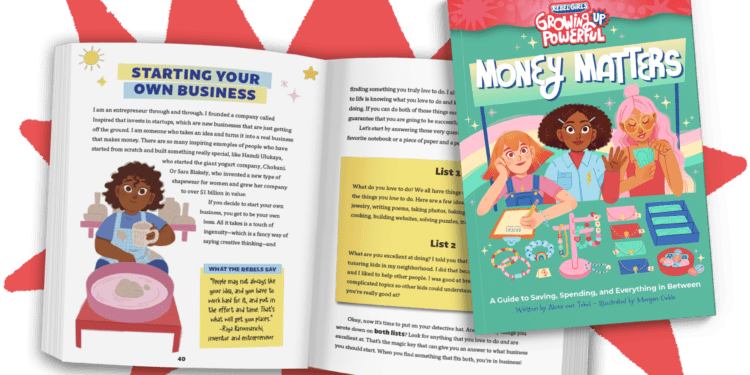Alexa von Tobel is a full-time investor, the founder and managing partner of Inspired Capital and author of the New York Times bestselling book Financially Fearless. She’s also a mother of three—two daughters and one son—and perhaps unsurprisingly, she started sharing financial wisdom with her kids not long after they could walk.
Now, von Tobel is helping set other parents and their children up for financial success with a new children’s book, Money Matters: A Guide to Saving, Spending, and Everything in Between, published by Rebel Girls.
“I very much wrote this as a fellow parent trying to do my part to empower parents everywhere,” she says. The book is an in-depth guide to earning, saving, spending, and everything in between, from creating a budget to getting started with investing to starting your own business.
The pages are full of colorful illustrations of girls chowing down on pancakes and dumping out their piggy banks, but the advice in here isn’t watered down; this is a practical, real-world look at financial planning from a certified financial planner (or, as von Tobel introduces herself in Money Matters, “basically a doctor of money”).
Like so many things in life, when it comes to talking with kids about money, Alexa von Tobel says it’s not about what you say so much as how you say it.
Use the right tone and language when talking about why money matters with kids
“Tone is the most important thing I want parents to focus on,” she says, referring to a University of Michigan study that found the tone you use around money can influence children as young as 5. “Meaning that by age 5, the tone of how a house operates around money does have a pretty sizable impact on how the child manages and thinks about money in their life going forward.”
Alexa Von Tobel encourages parents to speak about money in a positive way. Even when financial matters around the house might be stressful, as they often can be, it’s important to not let that negativity seep into conversations your child can hear. She suggests keeping it as matter of fact as possible, and talking about money “in a way that is very can-do,” with clear and straightforward statements like, “money is manageable,” “I can be strong with my money” and “money is something I can handle.”
That focus on tone should also be applied when you talk about earning money—in other words, how you talk to your kids about work. If you’re making a habit of speaking about your job negatively, saying things like, “Ugh, work is awful, I hate it, but I have to leave you and go to work,” your child is internalizing a simple message: Work is bad.
That’s not setting them up for success, von Tobel explains, since just about everybody needs to work to pay their bills. She makes sure to discuss work in a way that is positive and in terms they’ll associate with fun. For example, “Hey, you know how you like doing puzzles and you have fun doing puzzles? Mommy loves puzzles… but her puzzles are bigger, and they involve building companies and working with people and solving big challenges.”


